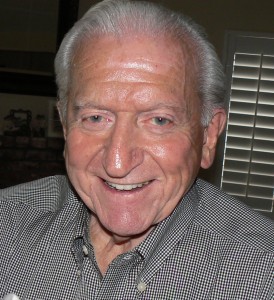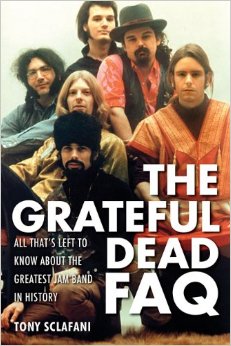My mother-in-law, Peggy Dickerson, died two years ago today, on January 27, 2010. My wife misses her so much. What follows is the text of the eulogy I delivered at her memorial service. Eternal rest, grant unto her O Lord and let perpetual light shine upon them her.
I would like to now say a few
words about my mother-in-law, Peggy Dickerson. She was born August 31, 1924 in Los Angeles, California. She was one of three children of Frankie Bernice and Andrew Buchanan Gardenhire.
But it was in the great American southwest, close to Yuma, Arizona, in which her family would plant its roots and she would meet her future husband. Peggy played the flute and piccolo, and was drum majorette at Yuma High School, graduating in 1942. She then attended University of Arizona in Tucson for 1½ years, leaving to marry 1st Lt. Joseph A. Dickerson, Jr. in 1944. She and Joe remained wedded for 62 years until his death in May 2006. In school she had been a track sprinter and basketball player, and she continued playing basketball in officers’ wives leagues. Her occupations included clerical and bookkeeping work, and she was self‑employed as a tax preparer for many years. She also enjoyed bridge throughout her life, a custom she brought with her to Atria Seville and did not cease practicing until early January of this year.
After Joe’s tour of duty in the Second World War, Peggy moved with her pilot husband to New York, Maryland, Germany, Japan, North Carolina, Nebraska, and Texas. After Joe retired from the Air Force in 1962, they settled in Arizona, and from there moved to Las Vegas, Nevada in 1965, where Joe was employed as an auditor for the Internal Revenue Service.
Between 1947 and 1956 Peggy and Joe became parents to four beautiful daughters: Coween Ann, Tamara Jo, Frankie Rozelle, and Jo Alexis.
Each move brought with it different challenges and opportunities. While as an officer’s wife, Peggy had at her disposal domestic help. But when Joe returned to school at the University of Arizona after retiring from the Air Force, she then became a civilian wife of a college student, while maintaining two jobs and taking care of her family including working outside the home. She didn’t want to leave North Carolina. But she did. When the IRS offered Joe employment in Las Vegas, she was not pleased. But she not only adjusted, she flourished. Living the rest of her days in Southern Nevada, she made numerous friends. Never shy or pretentious, Peggy could and would strike up a conversation with just about anyone, especially the butcher, who because of Peggy’s charm would provide to her special cuts not accessible to other customers. This, by the way, is a talent that her daughters have inherited.
Between 1969 and 2004, Joe and Peggy became grandparents to Jennifer, Carie, Treva, Jordan, Tyler, Alexander, and Gabriel; and great-grandparents to Finnegan and Mona Belle. After Joe’s death, Peggy’s granddaughter Treva and her husband Alex gave Peggy another great grandchild, Joseph Alexander, named after his late great grandfather. Peggy loved them all.
Peggy was a beautiful woman, both inside and out. Although one could attribute this to good fortune, I suspect that it had much more to do with the love that she and Joe shared for each other and for their family. In every good marriage, the whole is greater than the sum of its parts, and there is no doubt that in this couple this was true in spades.
Peggy was indeed beautiful, but she was no shrinking violet. With the sensibilities one acquires from the no-nonsense culture of the early 20th century American west and having survived the Great Depression and the Second World War, Peggy was like a character in Annie Get Your Gun, namely, Annie. For those who know her daughters, you immediately realize that the apple does not fall far from the tree.
I remember once, when I first began dating her daughter, Frankie, I had been invited to go out to a Chinese restaurant with Frankie and her entire family. I placed my order with the waiter, and after our food arrived and my dish was placed to the right of me, Peggy leaned over with a giant spoon and began scooping some of what I thought was my food onto her plate. Revealing my ignorance of the family-style customs indigenous to Asian cuisine, I asked her what she was doing and she said, “Taking what is mine.” I responded by accusing her of “Culinary socialism.” It was the beginning of a beautiful relationship.
Always the perfectionist, she would balance the check book to a penny. Her husband learned this early in their marriage. When after their first year he showed little talent in managing the finances, he begrudgingly turned it over to his wife and challenged her to do a better job. She remained the captain of that ship for the remaining days of their glorious marriage.
And yet, her frugality was borne out of a spirit of generosity, self-sacrifice, and devotion to family. During tough times Peggy got the most out of an airman’s small salary. She made curtains, became her own appliance repairman, and she even performed minor procedures on the family pets. While the girls were young she sometimes would deny herself such items as lotion and cosmetics so that her children could have shoes. Peggy also found a way to provide piano and ballet lessons for her daughters.
She saved money, not because she loved money, but because she loved life and she knew, as most of her generation, that prudence was the sort of virtue that shaped one’s character as much as it helped establish one’s security. She grew up in an era in which being well was the end, and not the mere means, for doing well.
When the fruit of her frugality allowed her to live a comfortable life free of financial worry, she was generous to family and friends.
After Joe died in 2006 we were concerned that Peggy would have a difficult time living without her husband. But, like the other challenges she faced throughout her life, Peggy not only weathered this one but persevered, forging new friendships and relationships, that provided her with a rich experience, while at the same continuing to attend and participate in family events and celebrations.
The word “eulogy” comes from the Latin for “speech or word of praise.” If St. Augustine is right that “no eulogy is due to him who simply does his duty and nothing more,” he would not object to my modest attempt to capture in words the life of Peggy Dickerson. For she was a woman of substance, someone who lived a full life with integrity and virtue. She did more than her duty. Each and every one of us is a better person for having known her. Thank you.
[photo taken in 1965. It is of my wife, Frankie, and her mother, Peggy]












